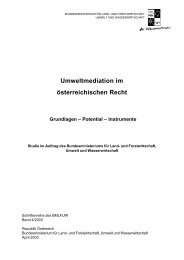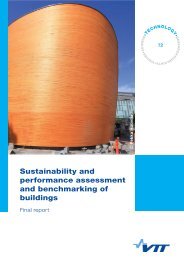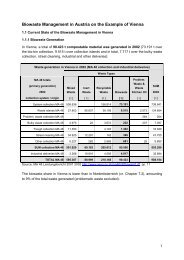Reflection sheet (pdf-file, 701 KB) - Partizipation
Reflection sheet (pdf-file, 701 KB) - Partizipation
Reflection sheet (pdf-file, 701 KB) - Partizipation
You also want an ePaper? Increase the reach of your titles
YUMPU automatically turns print PDFs into web optimized ePapers that Google loves.
How does sustainability get into participation<br />
processes?<br />
For more than 20 years the target of sustainability has been the central political<br />
concept for developing society and the environment so that both have a<br />
future. In 1987 the Brundtland Report defined sustainable development as<br />
“development that meets the needs of the present without compromising the<br />
ability of future generations to meet their own needs. [...] Thus the goals of<br />
economic and social development must be defined in terms of sustainability<br />
in all countries - developed or developing, market-oriented or centrally planned.”<br />
1 In the years that followed the target of sustainability was developed<br />
further into a number of concepts with differing emphases, and fleshed out<br />
both in the political arena and in the scientific community. 2<br />
Today key aspects of sustainability are to be found in innumerable statements<br />
of policy and strategies at the national and international level, such as the<br />
Rio Declaration and Local Agenda 21 (1992), the Charter of Aalborg (1994),<br />
the Aarhus Convention (1998), the EU Water Framework Directive (2000) and<br />
the EU Strategy for Sustainable Development (2006). In Austria a nationwide<br />
sustainability strategy (NSTRAT) was adopted by Parliament for the first time<br />
in 2002, and supplemented by the Federation and Provinces‘ all-Austrian<br />
sustainability strategy (ÖSTRAT) in 2010. In addition, specific programs for<br />
sustainability have been developed at province and community level.<br />
With the target in place in a whole series of political programs and official<br />
policies, sustainability goals gain in importance for participation processes.<br />
In conjunction with other directives (statutes, administrative orders, mission<br />
statements) the goals of and criteria for sustainable development point in a<br />
specific direction and stake out the scope for negotiation and decision within<br />
participation processes. Even if many of the directives and goals in question<br />
are purely for guidance, it is vital to take them into account in participation<br />
processes, in order to obtain outcomes that contribute to sustainable development.<br />
Below ways of shaping participation to take the various aspects of sustainability<br />
into full account are presented.<br />
1 World Commission on Environment and Development (the Brundtland Commission): Our Common Future,<br />
Oxford: Oxford University Press, 1987<br />
2 Further information on the current discussion on sustainable development can be found on the websites<br />
of the following institutions: International Institute for Sustainable Development: http://www.iisd.org/sd/<br />
sustainability and participation<br />
How does sustainability get into participation processes?<br />
2

















